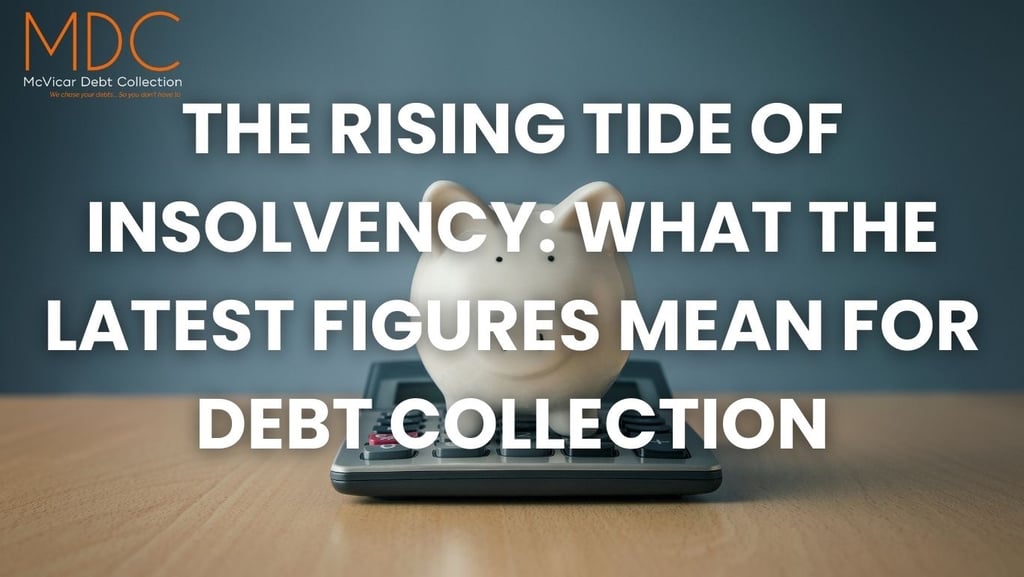The Rising Tide of Insolvency: What the Latest Figures Mean for Debt Collection
With insolvency rates hitting record highs in England and Wales, creditors face new challenges in recovering debts. In this post, McVicar Debt Collection explores the latest figures on IVAs, DROs, and bankruptcies, and what they mean for businesses and debt recovery strategies.


The recent Independent article “Record number of people took out debt relief orders in August” sheds light on a worrying trend: more individuals in England and Wales than ever before are entering into formal insolvency mechanisms. According to the report, 11,348 people entered insolvency in August 2025, comprising 4,239 debt relief orders (DROs), 6,487 individual voluntary arrangements (IVAs), and 622 bankruptcies. The number of DROs alone hit a record high, exceeding the previous peak in June 2024.
As a debt collection firm, McVicar is keenly aware of the implications of these shifts. We believe it’s essential not only to respond to these changes, but to adapt our practices in a way that balances the interests of both creditors and debtors, while operating within legal, ethical, and reputational boundaries.
What the Numbers Tell Us
Here are a few observations from the data:
DROs are surging: The abolition of the upfront £90 fee in April 2024, and expansions in eligibility (raising the debt threshold and widening exemptions), are likely contributing to the jump in DRO applications.
Sustained pressure on IVAs: While DROs dominate in volume, IVAs also remain above their recent averages. This suggests that not all debtors qualify (or choose) to enter DROs, so the structured settlement route is still relevant.
Bankruptcy remains low relative to the past: The article notes that bankruptcy numbers are still about half of pre-2020 levels, though they rose slightly year on year in August.
“Breathing space” registrations are rising: In August, there were 7,395 breathing space registrations, providing debtors with temporary protection to get their affairs in order.
These patterns point to a debt landscape under strain: households and small businesses are increasingly unable to meet financial obligations, and legal debt-relief routes are being accessed at scale.
Implications for Creditors & Debt Collection Agencies
As a firm whose purpose is to recover outstanding debts, McVicar must adjust its approach in light of these developments. Below are key lessons and actions we see as necessary:
1. Early engagement is more important than ever
Given that many debtors are now reaching tipping points quickly, it is vital for creditors (and debt collection partners) to engage early — before the debt becomes irrecoverable or triggers insolvency proceedings. Proactive outreach, flexible payment options, and transparent communication can sometimes avert escalation.
2. Enhanced due diligence on debtor capability
Before proceeding aggressively (e.g. legal demands), profiling a debtor’s financial capacity becomes more critical. In some cases, a debtor may already qualify (or be heading toward qualifying) for DROs or breathing space protections. Knowing this should temper strategy.
3. Understanding legal protections and restrictions
When someone is in a breathing space or enters a formal insolvency (IVA, DRO, bankruptcy), statutory protections kick in that restrict or prohibit creditor actions. We must remain vigilant to avoid unlawful or counterproductive steps (e.g. invalid letters or enforcement).
4. Collaboration with insolvency practitioners and intermediaries
In cases where an IVA or formal arrangement is being negotiated, there’s merit in working cooperatively rather than adversarially. Creditors that demonstrate willingness to negotiate may recover more in the long run than those who force debtors into insolvency.
5. Systems and staff training must adapt
Internal systems should flag accounts that may be insolvency-bound, track breathing space registrations, and route cases appropriately. Staff must be trained in the nuances of insolvency law and debtor rights to avoid missteps and reputational damage.
6. Strategic review of recoverability thresholds
Given the rising volumes of insolvency, creditors may need to revisit policies around write-offs, thresholds for pursuing small balances, and cost-benefit calculations on enforcing older debts.
McVicar’s Perspective & Commitment
At McVicar Debt Collection, we recognise the challenging times faced by many individuals and businesses. While our mandate is to recover legitimate debts on behalf of our clients, we are committed to doing so in a professional, lawful, and humane manner.
We believe:
Empathy matters: Many debtors are in distress not by choice, but by circumstance. A respectful, solution-oriented approach is more likely to yield sustainable outcomes.
Transparency builds trust: Clear communication about rights, options, and consequences helps reduce adversarial tensions and misunderstandings.
Flexibility can preserve value: Sometimes, accepting a lower but realistic repayment plan is better than pushing a debtor into insolvency, from which the creditor might recover little or nothing.
Continual adaptation is essential: The insolvency landscape is evolving. We must stay informed, update internal policy, and work with legal experts to ensure our practices remain compliant and effective.
Looking Ahead
The figures highlighted in the Independent’s article (see full article here: “Record number of people took out debt relief orders in August”) serve as a stark reminder that the problem of unsustainable debt is intensifying.
For creditors and collectors, the path forward requires a recalibration: better data, earlier intervention, legal awareness, and a shift toward more constructive engagement. McVicar remains committed to navigating these challenges with professionalism, adaptability, and respect for all parties involved.
If you are a creditor looking to understand how to adjust your debt recovery strategy in this climate, or a debtor seeking clarity on your rights and options, we encourage you to reach out. We’d welcome the opportunity to discuss how we can work toward practical, fair solutions.

